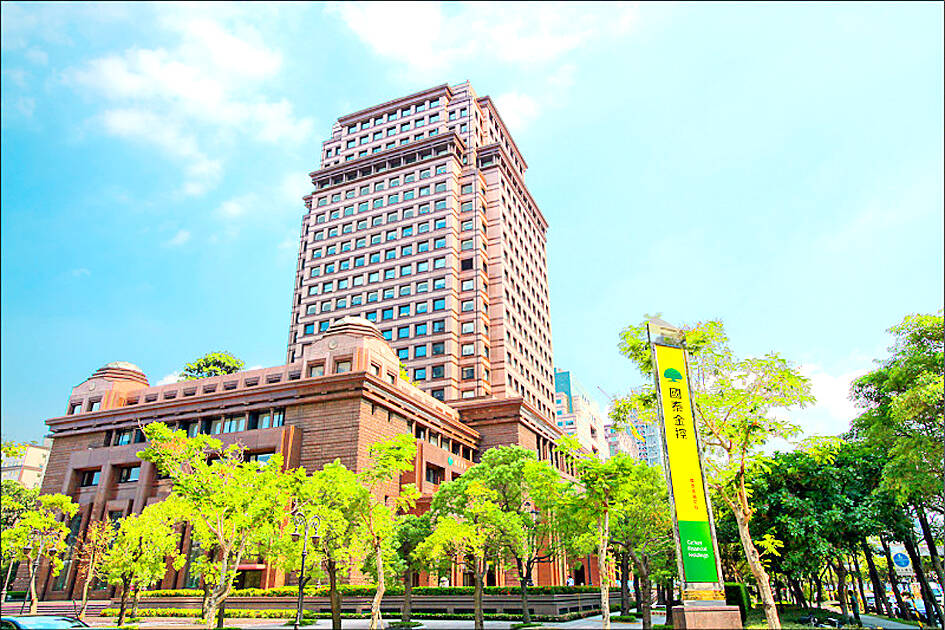Cathay Financial Holding Co (國泰金控) yesterday said it booked net income of NT$7.88 billion (US$244.34 million) last month, or earnings per share of NT$4.07.
Its main subsidiary, Cathay Life Insurance Co (國泰人壽), accounted for 53 percent of the company’s total net income, or NT$4.18 billion, as it booked a profit after global financial markets responded favorably to the US Federal Reserve’s extended pause in interest rate adjustments.
Capital gains more than offset hedging losses induced by a softening US dollar, it added.

Photo courtesy of Cathay Financial Holding Co
Cathay United Bank (國泰世華銀行), the company’s banking unit, generated NT$3.3 billion in net income last month, aided by robust lending, wealth management and credit card businesses.
The central bank’s interest rate hike in March also boosted interest income, the conglomerate said.
Cathay Securities Investment Trust Co (國泰投信) posted a net income of NT$190 million last month, or a 43 percent pickup from a year earlier, with its assets under management rising to NT$1.85 trillion thanks to its exchange-traded funds (ETFs) on the local bourse.
The three funds’ quarterly distribution of cash dividends grew to NT$284.4 billion, NT$150 billion and NT$100 billion last month, as Taiwanese investors displayed keen interest in ETFs targeting local shares and US bonds.
Fubon Financial Holding Co (富邦金控) meanwhile yesterday reported a record net income of NT$16.02 billion for last month.
The company attributed the results to soaring net income in its life insurance, banking and securities arms from a year earlier.
The figures translated into earnings per share of NT$4.57, enabling Fubon Financial to retain the title of “the most profitable conglomerate” among its peers in Taiwan last month.
Profit at Fubon Life Insurance Co (富邦人壽) spiked 726 percent year-on-year to a new high of NT$11.35 billion last month, primarily on the back of capital gains and interest income, the conglomerate said.
Fubon Life raked in hefty profits from its fund and stock investments and realized partial gains, it said, adding that its portfolio still maintained large unrealized gains as a result of global financial market rallies.
At the same time, Fubon Life increased its holdings of US bonds and incurred some foreign exchange losses due to the greenback’s 0.37 percent depreciation, it said.
Taipei Fubon Commercial Bank (台北富邦銀行) generated NT$2.53 billion of net income in the month, indicating 30 percent growth from a year earlier, helped by double-digit percentage advances in lending, and credit card and wealth management operations.
Fubon Securities Co (富邦證券) contributed NT$750 million of profit, a 60 percent rise from a year earlier, the conglomerate said.
The impressive showings came as little surprise given the TAIEX repeatedly hit record highs last month and received sizeable support from global fund inflows, the conglomerate added.

When an apartment comes up for rent in Germany’s big cities, hundreds of prospective tenants often queue down the street to view it, but the acute shortage of affordable housing is getting scant attention ahead of today’s snap general election. “Housing is one of the main problems for people, but nobody talks about it, nobody takes it seriously,” said Andreas Ibel, president of Build Europe, an association representing housing developers. Migration and the sluggish economy top the list of voters’ concerns, but analysts say housing policy fails to break through as returns on investment take time to register, making the

EARLY TALKS: Measures under consideration include convincing allies to match US curbs, further restricting exports of AI chips or GPUs, and blocking Chinese investments US President Donald Trump’s administration is sketching out tougher versions of US semiconductor curbs and pressuring key allies to escalate their restrictions on China’s chip industry, an early indication the new US president plans to expand efforts that began under former US president Joe Biden to limit Beijing’s technological prowess. Trump officials recently met with their Japanese and Dutch counterparts about restricting Tokyo Electron Ltd and ASML Holding NV engineers from maintaining semiconductor gear in China, people familiar with the matter said. The aim, which was also a priority for Biden, is to see key allies match China curbs the US

The popular Taiwan Semiconductor Manufacturing Co (TSMC, 台積電) arbitrage trade might soon see a change in dynamics that could affect the trading of the US listing versus the local one. And for anyone who wants to monetize the elevated premium, Goldman Sachs Group Inc highlights potential trades. A note from the bank’s sales desk published on Friday said that demand for TSMC’s Taipei-traded stock could rise as Taiwan’s regulator is considering an amendment to local exchange-traded funds’ (ETFs) ownership. The changes, which could come in the first half of this year, could push up the current 30 percent single-stock weight limit

NOT TO WORRY: Some people are concerned funds might continue moving out of the country, but the central bank said financial account outflows are not unusual in Taiwan Taiwan’s outbound investments hit a new high last year due to investments made by contract chipmaker Taiwan Semiconductor Manufacturing Co (TSMC, 台積電) and other major manufacturers to boost global expansion, the central bank said on Thursday. The net increase in outbound investments last year reached a record US$21.05 billion, while the net increase in outbound investments by Taiwanese residents reached a record US$31.98 billion, central bank data showed. Chen Fei-wen (陳斐紋), deputy director of the central bank’s Department of Economic Research, said the increase was largely due to TSMC’s efforts to expand production in the US and Japan. Investments by Vanguard International